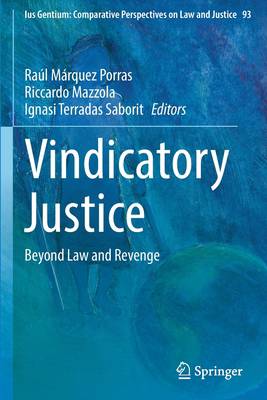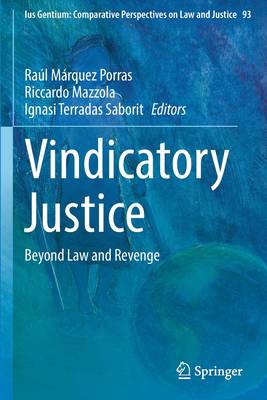
- Afhalen na 1 uur in een winkel met voorraad
- Gratis thuislevering in België vanaf € 30
- Ruim aanbod met 7 miljoen producten
- Afhalen na 1 uur in een winkel met voorraad
- Gratis thuislevering in België vanaf € 30
- Ruim aanbod met 7 miljoen producten
Vindicatory Justice
Beyond Law and Revenge
Omschrijving
This volume offers a new theoretical approach to the analysis of the law/revenge binary, and attempts to dismantle the common idea of revenge as lacking any legal, moral or rational dimension. In contrast, the book puts forward a model of a complex system of justice--which it terms 'vindicatory'--wherein vendetta constitutes an authorized action, the core of which does not (just) lie in vengeance but also in settlement procedures for peace--or 'composition.' The first part of the book ("Vindicatory Justice: Conceptual Analyses and Forerunners") seeks to identify the nature of vindicatory justice and to shed light on the structure of so-called vindicatory systems. In turn, the second part ("Mapping Vindicatory Justice") illustrates, using examples gathered from a range of sociolegal contexts, the dynamic relationship between composition and authorized revenge in vindicatory systems. Taken as a whole, the volume shows that applying a longue durée historical perspective to the study of revenge systems allows us to clearly recognize composition and authorized revenge as features of the same legal system, even though one of them may seem predominant (or more eye-catching) than the other in certain cultural settings.
Specificaties
Betrokkenen
- Uitgeverij:
Inhoud
- Aantal bladzijden:
- 290
- Taal:
- Engels
- Reeks:
- Reeksnummer:
- nr. 93
Eigenschappen
- Productcode (EAN):
- 9783030795979
- Verschijningsdatum:
- 18/11/2022
- Uitvoering:
- Paperback
- Formaat:
- Trade paperback (VS)
- Afmetingen:
- 156 mm x 234 mm
- Gewicht:
- 426 g

Alleen bij Standaard Boekhandel
Beoordelingen
We publiceren alleen reviews die voldoen aan de voorwaarden voor reviews. Bekijk onze voorwaarden voor reviews.










